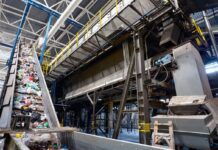![220112 PhosEnergy GEN-T schematic_FINAL[82] PhosEnergy GEN-T schematic](https://www.australianmanufacturing.com.au/wp-content/uploads/2022/01/220112-PhosEnergy-GEN-T-schematic_FINAL82-696x1017.png)
Media Release by IMCRC
A thermovoltaic device that will convert infrared energy from waste heat sources into electricity is being developed by PhosEnergy and the University of South Australia (UniSA) in collaboration with the Innovative Manufacturing Cooperative Research Centre (IMCRC).
The $314,000 research project, based at UniSA’s Future Industries Institute (FII) in Adelaide, will leverage PhosEnergy’s existing beta-voltaic technology and adapt it to create an efficient cost-effective device known as ‘GenT’.
Waste heat capture and utilisation technology has been identified as a growth area on the Recycling and Clean Energy National Manufacturing Priority road map and represents a key strategy for improving energy efficiency across Australia.
Bryn Jones, PhosEnergy’s Managing Director, said that PhosEnergy was excited to be working with IMCRC and UniSA’s FII to develop a product set to advance energy efficiency across a broad range of industry sectors.
“The GenT project epitomises PhosEnergy’s focus, which is to utilise innovative manufacturing and technology to convert underutilised or waste resources into valuable products,” he said.
“The IMCRC funding will enable us to accelerate the commercialisation of our technology by providing the resources we need to construct prototypes and determine their suitability across a range of applications.”
UniSA Professor Drew Evans said that FII researchers were looking forward to supporting PhosEnergy to develop and deliver an Australian technology that has the potential to become a new, renewable energy source for industry.
“For UniSA, the GenT project represents a new opportunity for our materials and manufacturing research to drive economic and social impact for our partners and Australia,” he said.
“The GenT project will utilise our expertise in materials R&D to help PhosEnergy develop a product of significant benefit to Australia’s and the world’s energy sector.”
Delighted to be co-funding the development of the Australian manufactured thermovoltaic technology, Dr Jason Coonan, IMCRC’s Deputy CEO, affirmed the importance of fast-moving research and development (R&D) collaborations.
“This 12 month project is a great example of how industry can effectively utilise Australian manufacturing and scientific research expertise to address industry challenges and create scalable solutions to globally relevant issues.”




















